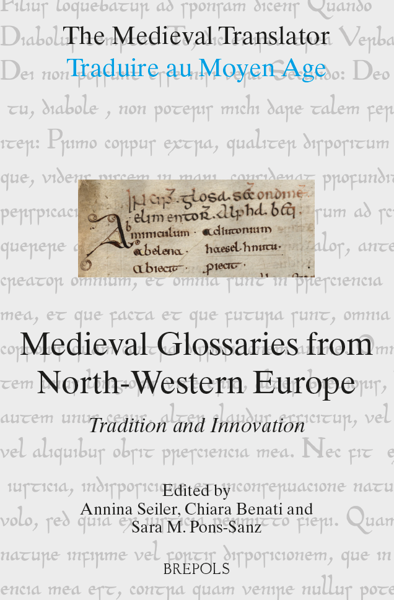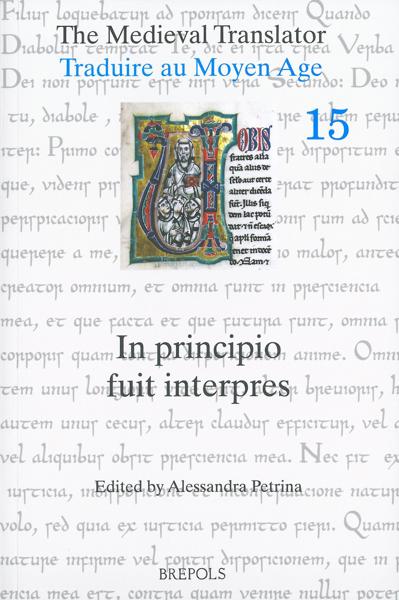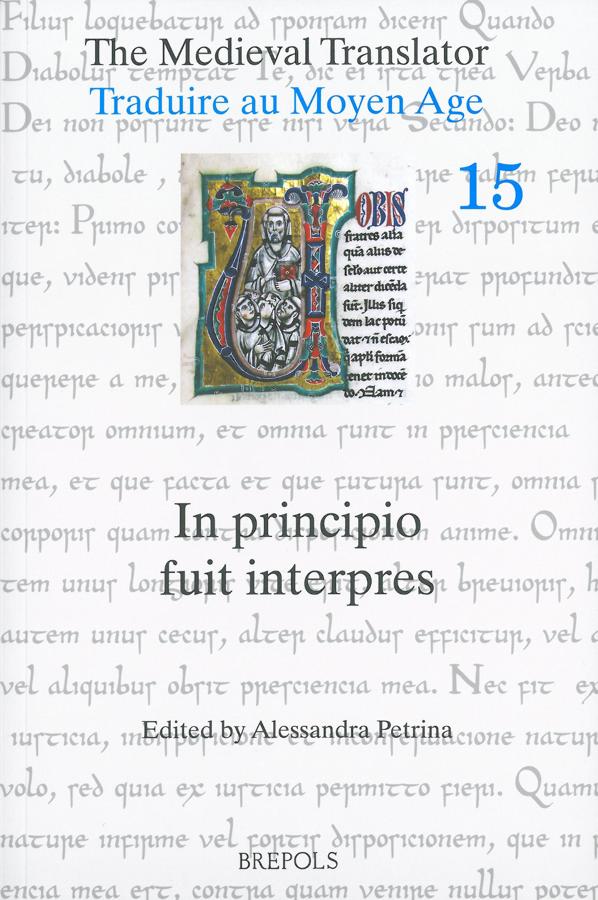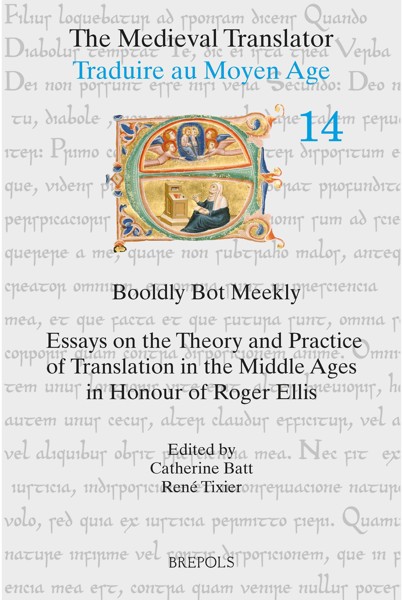
In principio fuit interpres
A. Petrina (ed)
- Pages: 366 p.
- Size:156 x 234 mm
- Illustrations:12 b/w, 1 tables b/w.
- Language(s):English, French, Italian
- Publication Year:2013
- € 85,00 EXCL. VAT RETAIL PRICE
- ISBN: 978-2-503-54909-5
- Paperback
- Available
- € 85,00 EXCL. VAT RETAIL PRICE
- ISBN: 978-2-503-55036-7
- E-book
- Available
"The scope of the conference is reflected in the four categories in which the papers have been organized. (...) This subdivision works well, and makes for a variety in the book that is richly informative and entertaining through the high quality of every single paper it contains." (Marleen Cré, in: Francia-Recensio, 2014/3)
"Les contributions réunies dans ce volume sont autant de fenêtres ouvertes sur le monde de la traduction au Moyen Âge. La traduction a toujours fait partie intégrante de la vie intellectuelle et culturelle et continuera à en faire partie. In principio fuit interpres, une formule aussi pérenne que la Bible, l’autorité dont elle s’inspire, dans un monde marqué par la mobilité et les échanges transnationaux." (Marthe Mensah, dans: Le Moyen Âge, CXX, 2014, p. 483-484)
“(…) un lavoro prodigo di spunti; la varieta degli argomenti trattati nei singoli saggi – di cui si e potuto in questa sede solo accennare – e armonizzata dalla visione critica d’insieme, che abbiamo cercato di sintetizzare nelle sue linee essenziali: il volume, secondo lo spirito delle Medieval Translator Conferences, segna una nuova e feconda tappa nella conoscenza dei molteplici aspetti del tradurre nel medioevo.” (Elisabetta Bartoli, negli Studi Medievali, LVIII/II, 2017, p. 876)
Translation studies centring on medieval texts have prompted new ways to look at the texts themselves, but also at the exchange and transmission of culture in the European Middle Ages, inside and outside Europe. The present volume reflects, in the range and scope of its essays, the itinerant nature of the Medieval Translator Conference, at the same time inviting readers to reflect on the geography of medieval translation. By dividing the essays presented here into four groups, the volume highlights lines of communication and shifts in areas of interest, connecting the migrating nature of the translated texts to the cultural, political and linguistic factors underlying the translation process. Translation was, in each case under discussion, the result or the by-product of a transnational movement that prompted the circulation of ideas and texts within religious and/or political discussion and exchange.
Thus the volume opens with a group of contributions discussing the cultural exchange between Western Europe and the Middle East, identifying the pivotal role of Church councils, aristocratic courts, and monasteries in the production of translation. The following section concentrates on the literary exchanges between three close geographical and cultural areas, today identifiable with France, Italy and England, allowing us to re-think traditional hypotheses on sites of literary production, and to reflect on the triangulation of language and manuscript exchange. From this triangulation the book moves into a closer discussion of translations produced in England, showing in the variety and chronological span covered by the contributions the development of a rich cultural tradition in constant dialogue with Latin as well as contemporary vernaculars. The final essays offer a liminal view, considering texts translated into non-literary forms, or the role played by the onset of printing in the dissemination of translation, thus highlighting the continuity and closeness of medieval translation with the Renaissance.
Alessandra Petrina is Associate Professor of English Literature at the Università degli Studi di Padova, Italy. She has published extensively on late-medieval and Renaissance literature and intellectual history, as well as on modern children’s literature, and edited a number of volumes on early modern English culture.
Part One: Setting new routes between Western Europe and the Middle East
Ivan Mariano, Rôle des interprètes et interculturalité: les négociations entre Latins et Grecs aux conciles de Bâle et de Ferrare-Florence (1431-1439)
Anne Mouron, ‘Sub mensa Patrum micas collegi’: the making of the Liber
Elisa Guadagnini, Cicéron et Boèce en Orient: quelques réflexions sur la Rectorique de Jean d’Antioche
Part Two: France and the Italian peninsula, crossroads of languages
Ludmilla Evdokimova, Deux types de traduction au milieu du XIVe siècle: Jean de Vignay et Jean Ferron, traducteurs du Libellus de ludo scachorum de Jacques de Cessoles
Jakub Kujawiński, Quand une traduction remplace l’original: la méthode du traducteur de l’Historia Normannorum d’Aimé du Mont-Cassin
Luca Morlino, Il capitolo francese della storia italiana dei volgarizzamenti: un primo abbozzo
Michael G. Sargent, Medieval and modern readership of Marguerite Porete’s Mirouer des simples âmes anienties: the manuscripts of the continental Latin and Italian tradition
Zeno Verlato, Il prologo e l’epilogo in alcuni volgarizzamenti agiografici in versi di area italiana. Una griglia interpretativa
Stefania d’Agata d’Ottavi, Chaucer’s multilevel translation of Filostrato in Troilus and Criseyde
Part Three: Defining identity through translation: the case of England
Élise Louviot, The style of Genesis A: pragmatic markers in the Old English verse translation of Genesis
Roberta Bassi, The use of word pairs in the Old English translation of Bede’s Historia ecclesiastica
Claudia Di Sciacca, Vulgarising Christianity: the Old English version of the Elucidarium
Federico Pantaleoni, Aldhelm’s Lorica, the Leiden Riddle, and Riddle 33 of the Exeter Book
Kenneth Tiller, Translating the Anglo-Saxon Chronicle Poems for the Anglo-Norman court
Marsha L. Dutton, Saints refusing to leave: Aelred of Rievaulx’s The Saints of Hexham as an inverted translatio
Alexandra Barratt, The sinful wretch, Dame Eleanor Hull, and Malchus the captive monk
Juliette Vuille, ‘Towche me not’: uneasiness in the translation of the noli me tangere episode in the late medieval English period
Catherine Innes-Parker, Translation, authorship, and authority: the Middle English Lignum Vitae
Ian Johnson, Translational topographies of language and imagination in Nicholas Love’s Mirror and A Mirror to Devout People
Jenny R. Rytting & Patricia L. Drews, Dialect translation in the manuscripts of The Reeve’s Tale
Catherine Royer-Hemet, Un périple linguistique en pleine guerre de Cent Ans: le Sermo Epinicius de Thomas Bradwardine
Part Four: Beyond medieval translation
Silvia Fumian, Traduire, interpréter ou commenter? L’illustration du Psautier Lat. 772 de la Bibliothèque nationale de France
Alina Zvonareva, Traduire la Danse macabre: la réception du modèle français dans les terres du Royaume d’Aragon
Naoë Kukita Yoshikawa, The translation of the Regimen Sanitatis into a handbook for the devout laity: a new look at the Kalender of Shepherds and its context
Julia Boffey, Banking on translation: English printers and continental texts
Roger Ellis, Prison translations of biblical and other texts in late-medieval England




